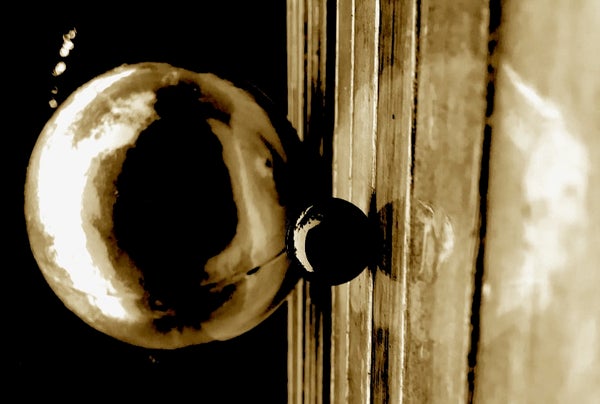This article was published in Scientific American’s former blog network and reflects the views of the author, not necessarily those of Scientific American
In the past century we’ve seen our ideas about the universe transformed. Not only has the cosmos turned out to be vastly larger than we once suspected, it’s also turned out vastly older. Indeed, the very fact that it has turned out to have an age, an origin, an emergence, has been revolutionary.
On top of those revelations, we find evidence that all that we see is not all that there is. Specifically, we don’t seem to be accounting for all the matter in the cosmos when we look at luminous stars, gas, and dust: Galaxies rotate faster in their outskirts than might be anticipated. Light's path is diverted more strongly than might be expected by mass distorting the fabric of space across the scales of galaxies and clusters of galaxies. Tiny temperature fluctuations of the cosmic microwave background, that we think reflect small variations in matter’s distribution in the young universe, make the most sense if we invoke an ocean of entirely unseen matter, sculpted by gravity alone, with no other interaction with the forces of nature. This dark matter seems, for now, to be a major constituent of the cosmos, along with an unseen, dark energy – an energy of the vacuum – that appears to be accelerating the swelling growth of space.
Altogether this displaces ‘ordinary’ matter - the protons, neutrons, electrons and other detectable species - into a minority bucket that contains around 5% of the total mass-energy of the universe. Or, in terms of mass alone, some 15% of the cosmos is the stuff we’re composed of, the other 85% seems to be dark matter (whatever that actually is).
On supporting science journalism
If you're enjoying this article, consider supporting our award-winning journalism by subscribing. By purchasing a subscription you are helping to ensure the future of impactful stories about the discoveries and ideas shaping our world today.
That is pretty strange. But even stranger is how little space all of that ordinary matter takes up.
A mathematical parlor trick tells us that all the stars in our galaxy could, in principle (assuming they were all the same size as our Sun, which is a bit of a sleight of hand), be arrayed into a cube that would fit inside the orbit of Neptune. Further trickery tells us that all the stars in the observable universe could fit inside a cube of only 10 light-years on a side.
But stars are by no means the most compressed forms of matter. What if we could gather up just the protons and neutrons of the cosmos and pack those together? (Electrons being rather fuzzier quantum objects, whose effective physical size is even harder to be sure of)
The numbers here are very, very approximate. In general, it is estimated that there are of the order of 1080 particles of normal matter in the observable universe (i.e. out to the light travel horizon accessible to us). That is a catch-all number, containing everything. In that sense it is relatively conservative for our purposes.
Since protons have an effective charge radius of around 8.4x10-15 meters, and the physical presence of neutrons seems to be similar we can take this as one measure of size. This indicates that all of the normal matter of the observable universe could be gathered up and arrayed into a cube with sides 3.9x1012 meters, or 0.00034 light years, or 21.4 AU.
That’s almost small enough for the cube to fit inside the orbit of Saturn. (This number is also, not surprisingly, very close to what one gets from using the estimated mean density of normal matter and the estimated proper diameter of the observable universe, which is around 93 billion light years. It's also close to the number obtained using the measured size of neutron stars versus normal stars.)
Eliminate the truly empty space of the cosmos and it's amazing how little is left.
The bottom line is that we live in a universe that is remarkably devoid of the stuff that makes us. Were it not for our prejudice that our fancy matter, with its electromagnetic interactions and so forth, is somehow special, you might look at the cosmos and think that we are part of a ghostly sprinkling of something entirely otherworldly.
In other words, maybe we are really the spooks of the universe.
